Legislators yesterday again failed to deliver on a promise to come to a consensus on amending the Act Governing Food Sanitation (食品衛生管理法) to address perceived flaws in the Taiwan-US protocol that allows the entry of what some lawmakers have called “unsafe US beef products.”
Legislators initially set a deadline of Nov. 17 to amend the legislation based on the agreed conclusion reached at a cross-party negotiation meeting, however, lawmakers last Friday postponed the deadline to yesterday, but a settlement is still not in sight.
The Democratic Progressive Party (DPP) caucus yesterday revised its original version. The original banned imports of skull, brains, eyes, spinal cords, ground beef and intestines from “areas affected by mad cow disease or areas with a history of the infections,” while the new version banned such products from “areas affected by mad cow disease or areas with a history of the infection in the last 10 years.”
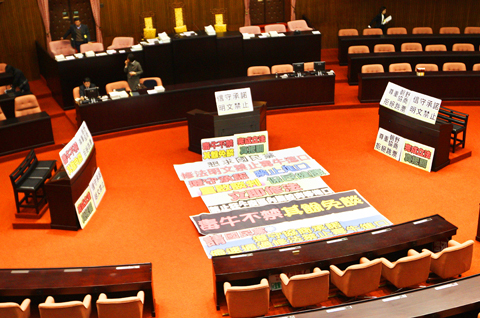
PHOTO: CNA
The Act had allowed the import of US ground beef and intestines, but if the amendment passes, such imports would be banned from entering the country because the US discovered its third mad cow disease case in 2003.
“The latest DPP version was close to the [KMT caucus’] position, but the Presidential Office still has concerns over violation of the protocol,” KMT caucus whip Lu Hsueh-chang (呂學樟) said.
“If the Presidential Office is OK with the DPP’s version, the KMT caucus will support it. If not, we hope the Office will explain to the public its reasons,” Lu said.
The KMT’s latest proposal says that skulls, brains, eyes and spinal cords imported from areas where mad cow disease has been reported in the past 10 years should be banned from entry and ground beef and intestines without examination credentials issued by exporting countries that it has been thawed and passed batch-by-batch inspections should not be allowed entry.
The legislative plenary session, scheduled to review bills, sat idle the whole day yesterday because of the disagreements.
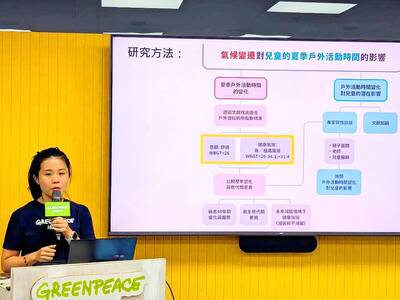
The government should improve children’s outdoor spaces and accelerate carbon reduction programs, as the risk of heat-related injury due to high summer temperatures rises each year, Greenpeace told a news conference yesterday. Greenpeace examined summer temperatures in Taipei, New Taipei City, Taoyuan, Hsinchu City, Taichung, Tainan and Kaohsiung to determine the effects of high temperatures and climate change on children’s outdoor activities, citing data garnered by China Medical University, which defines a wet-bulb globe temperature (WBGT) of 29°C or higher as posing the risk of heat-related injury. According to the Central Weather Administration, WBGT, commonly referred to as the heat index, estimates
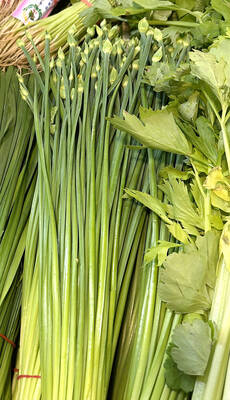
The Taipei Department of Health’s latest inspection of fresh fruit and vegetables sold in local markets revealed a 25 percent failure rate, with most contraventions involving excessive pesticide residues, while two durians were also found to contain heavy metal cadmium at levels exceeding safety limits. Health Food and Drug Division Director Lin Kuan-chen (林冠蓁) yesterday said the agency routinely conducts inspections of fresh produce sold at traditional markets, supermarkets, hypermarkets, retail outlets and restaurants, testing for pesticide residues and other harmful substances. In its most recent inspection, conducted in May, the department randomly collected 52 samples from various locations, with testing showing
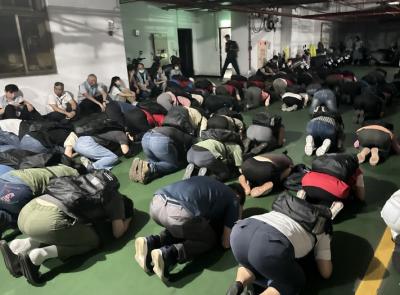
Taipei and other northern cities are to host air-raid drills from 1:30pm to 2pm tomorrow as part of urban resilience drills held alongside the Han Kuang exercises, Taiwan’s largest annual military exercises. Taipei, New Taipei City, Keelung, Taoyuan, Yilan County, Hsinchu City and Hsinchu County are to hold the annual Wanan air defense exercise tomorrow, following similar drills held in central and southern Taiwan yesterday and today respectively. The Taipei Mass Rapid Transit (MRT) and Maokong Gondola are to run as usual, although stations and passenger parking lots would have an “entry only, no exit” policy once air raid sirens sound, Taipei
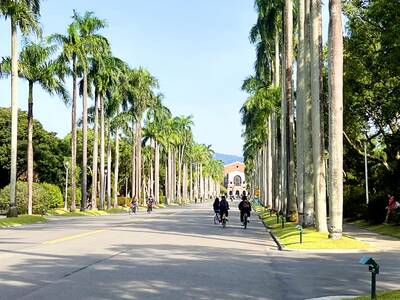
Taipei placed 14th in the Quacquarelli Symonds (QS) Best Student Cities 2026 list, its highest ever, according to results released yesterday. With an overall score of 89.1, the city climbed 12 places from the previous year, surpassing its previous best ranking of 17th in 2019. Taipei is “one of Asia’s leading higher-education hubs,” with strong employer activity scores and students “enjoying their experience of the city and often keen to stay after graduation,” a QS staff writer said. In addition to Taipei, Hsinchu (71st), Tainan (92nd), Taichung (113th) and Taoyuan (130th) also made QS’ list of the top 150 student cities. Hsinchu showed the